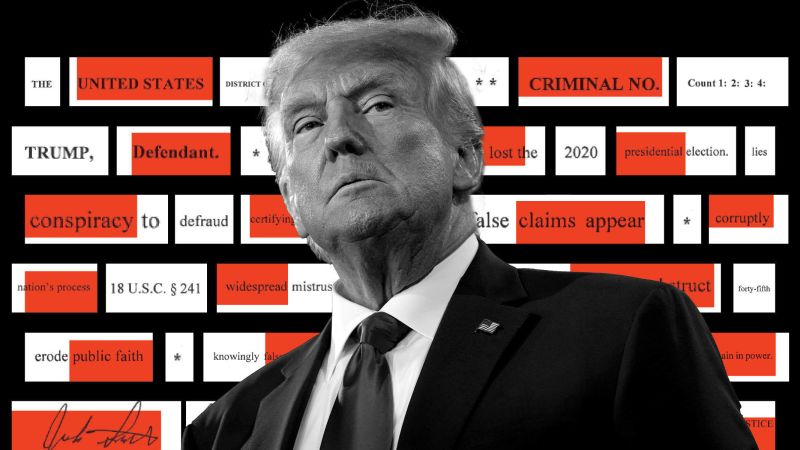 Dear Commons Community,
Dear Commons Community,
On Tuesday, special counsel Jack Smith unsealed his latest criminal indictment of Donald Trump, and like the first indictment he filed against the former president, over his handling of classified documents, it was made up of hundreds of hours of grand jury testimony given by Republican witnesses, many of them former members of Trump’s administration.
Trump and his political allies have attacked the indictment as being politically motivated, but as with the House Jan. 6 committee’s final report on the insurrection at the U.S. Capitol, Tuesday’s indictment is notable in that the evidence of criminal activity comes almost exclusively from Republicans sympathetic to Trump who testified under oath. Here is a compilation courtesy of Yahoo News.
On the witness list
Among those who sat for questioning from prosecutors and whose answers were reviewed by the grand jury are the following:
- Former Vice President Mike Pence
- Former Trump chief of staff Mark Meadows
- Pence aides Greg Jacob and Marc Short
- Former White House deputy chief of staff Dan Scavino
- Former White House speechwriter Stephen Miller
- Former Trump lawyer Rudy Giuliani
- Trump attorney and adviser Boris Epshteyn
- Former White House counsel Pat Cipollone
- Former Department of Homeland Security official Ken Cuccinelli
- Former Director of National Intelligence John Ratcliffe
- Former House Speaker Newt Gingrich
- Chairman of the Nevada Republican Party Michael McDonald
- Former White House aide Nick Luna
- Former White House personnel director John McEntee
- Former Trump campaign deputy director Gary Michael Brown
- “Stop the Steal” organizer Ali Alexander
- Georgia Secretary of State Brad Raffensperger
- Numerous so-called fake electors from multiple states
Dead people voting in Georgia
Again and again, the indictment makes clear, first, that Trump repeatedly lied to the American people that fraud had cost him victory in the 2020 election and, second, that members of his staff, many of whom testified before the grand jury, told him there was no evidence to back up his claims.
When Trump spoke with Raffensperger on Jan. 3, 2021, for instance, he claimed 5,000 dead people had voted in Georgia.
“Well, Mr. President, the challenge you have is the data you have is wrong,” Raffensperger replied, adding, “The actual number were two. Two. Two people that were dead that voted. And so [your information]’s wrong, that was two.”
On Jan. 6, Trump went on to claim publicly and without evidence that 10,300 dead people had voted in Georgia.
‘Yeah, you’re right, it’s too late for us’
At a Jan. 3, 2021, meeting between Trump and Gen. Mark Milley, chairman of the Joint Chiefs of Staff, Trump appeared to acknowledge his defeat to Joe Biden in the 2020 election. Milley briefed Trump on national security situations, advising that the president refrain from taking any action, since he was only 17 days from leaving office.
“Yeah, you’re right, it’s too late for us. We’re going to give that to the next guy,” Trump allegedly said.
Milley sat for interviews with the House select committee, and Smith has relied on those findings.
‘Just say that the election was corrupt’
On Dec. 27, 2020, Trump called Jeffrey Rosen, then acting attorney general, and Richard Donoghue, acting deputy attorney general, and “raised multiple false claims” about the election, according to the indictment. Donoghue had a meeting with prosecutors but was not called to testify.
“When the Acting Attorney General told the Defendant that the Justice Department could not and would not change the outcome of the election, the Defendant responded, ‘Just say that the election was corrupt and leave the rest to me and the Republican congressmen,’” the indictment states.
‘You’re too honest’
Although Pence sought to avoid testifying before the grand jury on the grounds that he was acting as the president of the Senate when certifying the Electoral College vote, a federal judge ruled that he must testify and detail his conversations with Trump prior to Jan. 6, 2021.
One such conversation featured in the indictment occurred on Jan. 1, 2021. Trump had called Pence to berate him for not going along with a plan to have him reject the certification of the Electoral College vote.
“The Vice President responded that he thought there was no constitutional basis for such authority and that it was improper,” the indictment states. “In response, the Defendant [Trump] told the Vice President, ‘You’re too honest.’”
Pence should have replied: “And Mr. President you’re too dishonest!”
Tony






